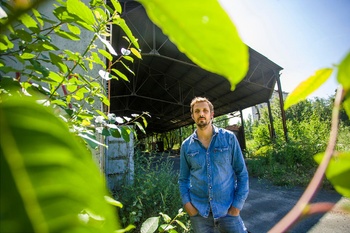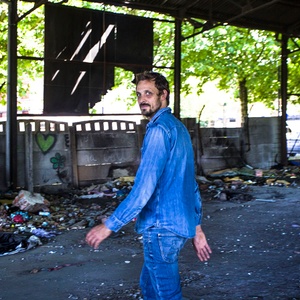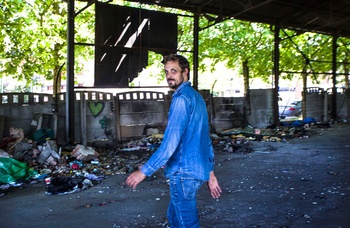During the summer, we are leaving the towpath of our everyday existence and exploring the person behind a Brussels-based artist in a conversation about the sun, love, and life. This week’s chronicler of the summer is Ultima Vez choreographer Seppe Baeyens, whose heart-warming social choreography Invited has been selected for Het TheaterFestival.
© Heleen Rodiers
Also read: Chronique d'un été : Jasmina Douieb
Are you happy? “Yes, I am. The question, of course, is how you define happiness, but I do feel like things are going well. I have fewer questions than I used to, and everything seems to have worked out more or less. That is partly thanks to Invited. For as long as I have been involved in dance, I have been exploring what dance means to me, and what my dance might mean to the audiences of dance. For the first time, I feel as though I have found a direction or a language through which I can progress. I don’t feel as though I need to prove myself and that something is happening that is more aligned with my personality.”
“I never received any formal training in dance, choreography, or directing. My schooling consisted of encounters with people who influenced me. But at a certain point you have to develop your own art. I had been exploring the social for a long time; things like interaction, encounter, and connection. I call it social choreography, but what that is exactly had never been so clear as it now is in Invited.”
“It is a production that will hopefully make the audiences happy. Being part of a community or achieving something together is something a lot of people miss in our individualized age. People enjoy being able to share something with others for an hour and a quarter. Some people even stay in the theatre after the performance because they want the feeling to last just a little longer.”

© Heleen Rodiers
Is it difficult to be yourself? To what extent do you adapt? “In the past I was always looking for another and the other. I remember that the first friend I had in nursery school was a little black boy. I never wanted to stay in my little village. I wanted to explore the world. That perspective now coincides with my work. Outside on the street, I just ran into Leon, my 94-year-old dancer, and Slobodan, a young, ten-year-old Serbian boy who should have been at school. We were chatting, and Slobodan asked Leon if he could help him with his shopping. They know each other from the Ultima Vez dance studio. I have always felt like a citizen of the world. Somebody with an urge to discover and engage in dialogue on different levels. Slobodan from the Balkans is more interesting to me than a local Flemish boy would be. That’s why I enjoy living in Brussels, which is a window on the world.”
“I used to be much more concerned about what others thought of me. I was born into a big family in which the children were lovingly ‘neglected’, and that is probably one of the reasons I am so adaptable. But as I get older, I have taken more distance and become more interested in the question of who I am. Difference creates tension or conflict and that is interesting.”
I sometimes compare myself to a big dog. Big dogs need a lot of exercise.

Do you believe in love? Or in something else? “I do believe in love, yes. It is part of being together. Love is actually connection, belonging somewhere. The love of neighbour is an essential value for life and it ensures that you don’t become bitter. I’m not sure if bitterness is exactly the opposite of love, but I do think that you have to be able to love yourself, and that you have to be loved enough to be able to love. So perhaps we ought to love embittered people more instead of distancing ourselves from them. I don’t think that we realize enough that many people are alone. If things aren’t going well at work and then you break up with your partner, you suddenly have very little connection, and I think that connection is essential.”
Do you often feel powerless (politically or otherwise)? “I am not literally involved in politics, but I do think that my work has a message that can be political. Invited is about citizenship and about taking initiative. And about the fact that you can always play a meaningful role, even if you live in a small community.”
“You can achieve a lot just by being yourself and through your openness to the world, without having to campaign on the barricades. Even in the micro society of your neighbourhood, street, or country, you are someone and you have a certain power. I think too that if you give up and withdraw – if you say ‘this is my house and my garden, and that is enough’ – that you lose that power.”
What effect does the summer have on you? “I have never been able to let go of the idea of ‘summer holidays’. I still think in terms of school years, but fortunately the cultural season runs pretty much parallel. I think it is very important to be able to take a break.”
“I also feel an urge to be outside. Outside the city, I mean. I grew up in a farming village and want to pass that other world on to my children. Things are looking great this summer because I am going to Indonesia with my wife and children.”

© Heleen Rodiers
| Citizen of the world Seppe Baeyens is exploring an abandoned hangar between metro Beekkant and the Ultima Vez studios.
What keeps you up at night? “When everything is going well, I am tired in the evening. I sometimes compare myself to a big dog. Big dogs need a lot of exercise. I play endurance sports and need great physical exertion to relax. I like to start the weekend by taking a run. It makes me more relaxed and more peaceful afterwards.”
“I also really need my practice. I would never be able to work at a desk. That’s why I do what I do.”
What book might we find on your bedside table? “I am taking some classics on holiday with me, like A Little Life by Hanya Yanagihara, The Discovery of Heaven by Harry Mulisch, and 1Q84 by Haruki Murakami. On my bedside table right now, you will find A Jihad for Love by Mohamed El Bachiri and David Van Reybrouck. It was a present from Kristin Rogghe [city dramaturge at the KVS – MB]. It is not a big book, but it was very moving. Partly because it is about a metro train driver: somebody you see every day but do not know, and who has a life and a world that you don’t see. The reason they wrote the book is of course horrendous, but I think it is very beautiful that after reading the story, you see people from a different perspective. And our perspectives often need changing.”
When was the last time you cried? Does that happen often? “Unfortunately, almost never. I can be very moved by stupid things – a sensation, a smell, or a sentimental film. But I stopped crying at some point. It was probably due to the conditions in my big family: we always had to keep on going. There wasn’t enough time for everyone to be completely open about their emotions all the time.”
Perhaps there is still something of the hunter-gatherer in me. Back to the roots from which everything grew
What is your biggest shortcoming? “Uncertainty, and the urge to please people. What do others think about me? Thinking about that really tires me. Belonging is important, but you are often more interesting if you do not act based on the expectations of others. The latter might create a comfortable situation, but not the most powerful or forceful one.”
“Of course, many artists suffer from wanting to be loved. You take the successes and failures of your work personally. But that vulnerability makes things more interesting. And you have to be grateful that you can continue to develop and evolve. It is important to keep your feet on the ground, and arrogance is dangerous. However well things are going after a hundred performances, you always have to go back to basics.”
What upsets you? “I do my best not to get upset with other people. I do sometimes have difficulty with noises that come from multiple directions at the same time. If there is music playing and people talking over each other while I am trying to concentrate, for example.”
In which other age would you have wanted to live? “Honestly? None. Or actually, perhaps there is still something of the hunter-gatherer in me. The urge for adventure and the need for physical exertion that I mentioned earlier. As a child I was fascinated by apes, how they live together, how the grasp of a hand changes, how tools were developed. Going out to hunt and catch an animal is something I think I would have enjoyed. Back to the roots from which everything grew. The very beginning, in which instincts still played a big role, and during which the first communities were formed.”
Het TheaterFestival: Invited 30/8 > 1/9, deSingel, Antwerpen
TAZ#2018: Ief Spincemaille: Rope 25/7 > 1/8, Oostende
Read more about: Podium
Fijn dat je wil reageren. Wie reageert, gaat akkoord met onze huisregels. Hoe reageren via Disqus? Een woordje uitleg.